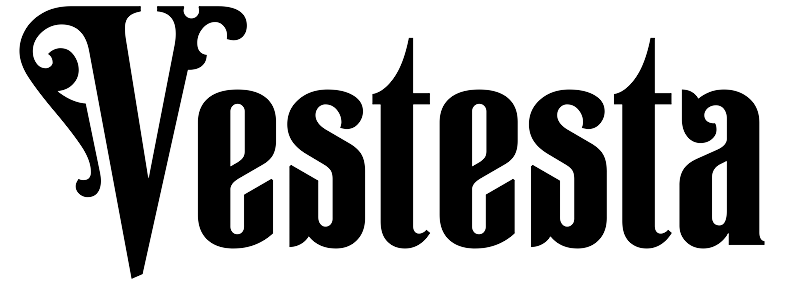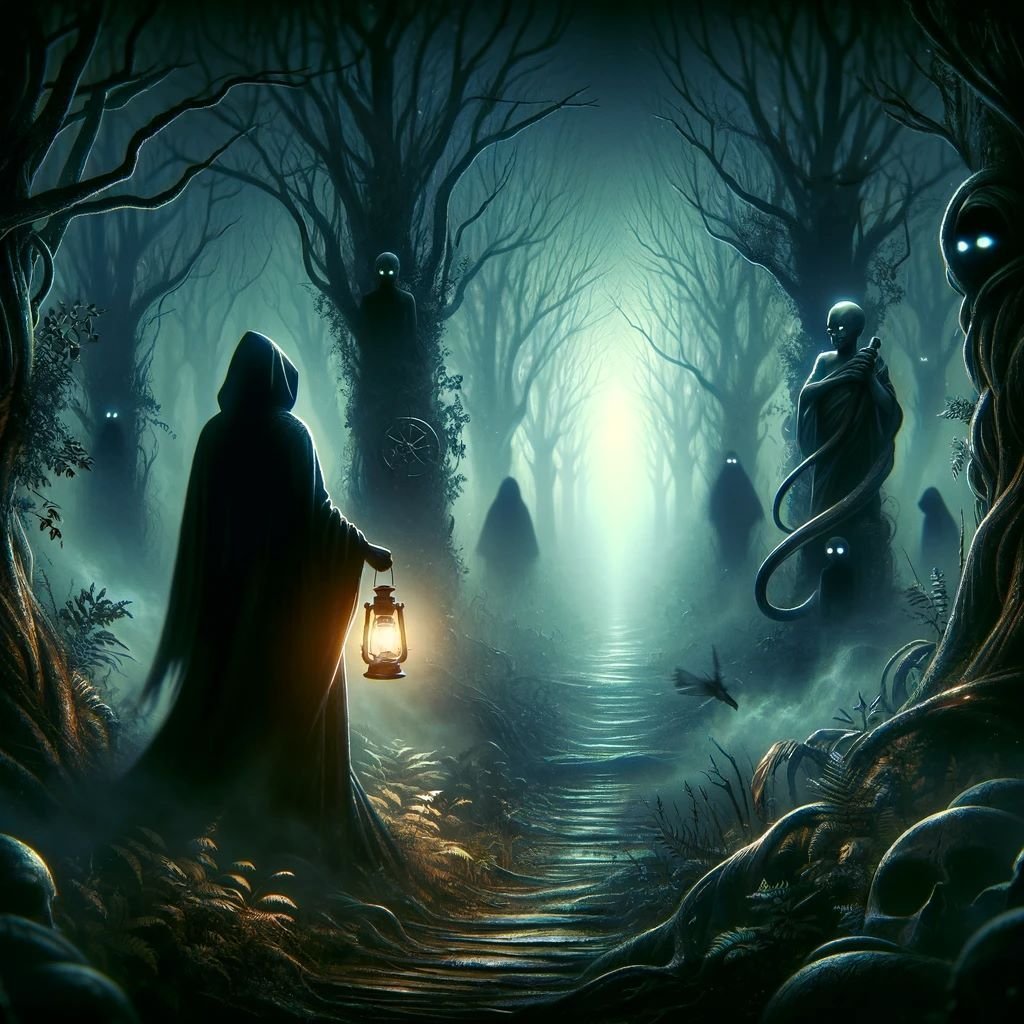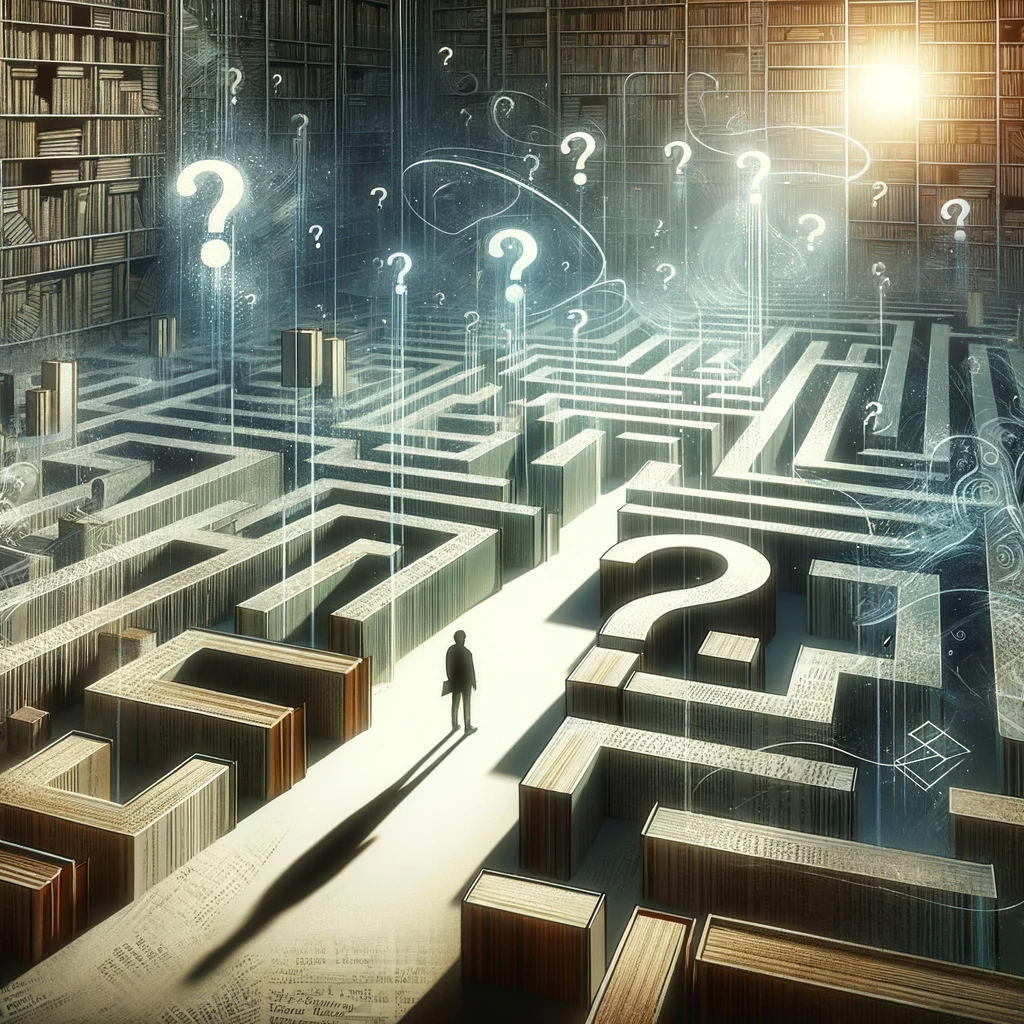Welcome to the twilight realm of moral ambiguity in dark fantasy, where the line between hero and villain is as elusive as a wraith in the fog. This genre doesn’t just entertain; it probes the murky depths of ethics and morality, presenting us with characters and situations that defy easy categorization. But why does this ambiguity captivate us, and how does it shape the dark, fantastical narratives we love? Let’s embark on a journey through the shadowed moral landscapes of dark fantasy and uncover the allure of the ambiguous.
The Ethical Enigma: Defining Moral Ambiguity in Dark Fantasy
Dark fantasy delves into the murky waters of moral ambiguity, presenting a world where the lines between right and wrong are blurred and the ethical landscape is as shadowy as the settings. This genre doesn’t just entertain; it challenges and provokes, asking both its characters and its audience to reconsider their notions of morality. Let’s explore the ethical enigma at the heart of dark fantasy, where every decision is shrouded in shades of gray.
Shades of Grey in a Black-and-White World
Beyond Good and Evil: In the realm of dark fantasy, characters navigate a world where the traditional boundaries of good and evil dissolve. They operate in a space where motives are complex and multifaceted, and the moral path is obscured by mist and shadow. These characters, whether they’re reluctant heroes, misunderstood monsters, or something in between, face choices that defy easy ethical categorization. This ambiguity is what gives dark fantasy its depth, turning simple tales into complex ethical explorations.
The Reluctant Antihero: The protagonists of dark fantasy are a far cry from the knights in shining armor found in traditional tales. They are the reluctant antiheroes, marked by their flaws and inner conflicts. They might be driven by revenge, desire, or a twisted sense of justice, making them intriguing yet sometimes unlikable. Despite this, or perhaps because of it, they are often at the center of the narrative’s most pivotal decisions. Their choices and actions drive the story forward, offering a nuanced look at what it means to be a hero in a world where the ethical compass is constantly spinning.
The Weight of Choices: Consequences and Repercussions
Decisions That Echo: In dark fantasy, every choice has its echo, its ripple effect that extends far beyond the immediate moment. These decisions are heavy with consequence, shaping the narrative in profound and often unexpected ways. Characters must navigate this treacherous terrain, knowing that their actions could lead to salvation or ruin, not just for themselves but for their entire world. This weight makes every decision a pivotal moment, turning the story into a complex web of cause and effect.
A Reflection of Reality: The moral ambiguity of dark fantasy is more than just a narrative device; it’s a reflection of the real world’s ethical complexities. Just as in our own lives, the characters in these stories face dilemmas where the right choice is unclear, where the ethical path is tangled in a web of personal belief, cultural norms, and situational nuances. This genre holds up a dark mirror to our own world, challenging us to reflect on our values and the decisions we make.
Navigating the Shadows: The Journey of Moral Ambiguity
Dark fantasy invites us on a journey through the ethical shadows, a trek where every step is uncertain, and every turn reveals new complexities. As we navigate this genre, we’re compelled to confront our preconceptions about morality, to question what we believe and why. The characters we meet and the choices they make resonate because they reflect our struggles, our doubts, and our desires. In the murky world of dark fantasy, the ethical enigma is not just a narrative twist; it’s a fundamental exploration of the human condition. So, as we delve deeper into these shadowy realms, let’s embrace the ambiguity, ready to ponder, question, and perhaps even redefine our understanding of right and wrong.
Characters in Conflict: The Personal and the Moral
In the shadowy world of dark fantasy, characters are often caught in a web of personal and moral conflict, where the battles they face are not just physical but deeply psychological. The heroes and villains of these tales are complex figures, each carrying their own burdens and demons, each walking a fine line between darkness and light. Let’s delve into the intricacies of these characters, exploring how their inner conflicts and moral dilemmas define the heart of dark fantasy.
Heroes on the Edge
The Battle Within: Dark fantasy heroes are rarely the untarnished figures of legend. Instead, they are deeply flawed, often wrestling with internal conflicts as fierce as the monsters they face. These struggles with guilt, desire, duty, and a haunted past add layers of psychological complexity to their journeys. Their decisions are not just about right and wrong but about survival, identity, and the ghosts of their past. This inner turmoil makes their moral choices all the more compelling and unpredictable, as they navigate a path that’s fraught with personal demons and ethical dilemmas.
Redemption, Ruin, or Something in Between: The journey of dark fantasy heroes is a winding path with no clear destination. Some find redemption through their trials, emerging from the darkness with a newfound sense of purpose or understanding. Others may spiral further into despair or villainy, consumed by the very shadows they sought to overcome. And many find themselves somewhere in between, in a gray area that challenges our notions of heroism and redemption. Their stories leave us pondering the true nature of redemption and whether it’s an end point or a continuous, evolving process.
Villains with a Vision
Sympathy for the Devil: In dark fantasy, the antagonists are often as complex and compelling as the protagonists. These characters can have tragic backstories, understandable motivations, and a vision that, while twisted, makes sense from their perspective. They challenge us to reconsider the nature of evil, posing the question of whether malevolence is an inherent trait or a tragic response to circumstances beyond one’s control. By humanizing the villain, dark fantasy blurs the line between good and evil, asking us to empathize and understand rather than outright condemn.
The Complexity of Cruelty: The villains of dark fantasy invite us to explore the darker aspects of human nature. They are a study in the roots of malevolence, the psychology of power, and the fine line that separates ambition from tyranny. These characters force us to confront uncomfortable truths about the capacity for cruelty within all of us and the circumstances that can push someone over the edge. They are a reminder that the potential for darkness resides in everyone and that the difference between a hero and a villain can sometimes be a matter of perspective and choice.
Navigating the Gray: The Personal and Moral Struggles in Dark Fantasy
Dark fantasy is a genre where the personal and the moral are inextricably linked, where the battles fought are as much within the characters as they are with external forces. As we journey through these narratives, we’re invited to reflect on our own inner conflicts, our understanding of redemption, and our definitions of good and evil. The characters we meet are mirrors, reflecting the complexities and contradictions of the human spirit. In the world of dark fantasy, the most compelling stories are not just about defeating monsters but about confronting the ones that live within us, navigating the gray areas that define us all.
Moral Mazes: The Impact of Ambiguity on Narrative and Reader
In the twisting corridors of dark fantasy, moral ambiguity isn’t just a narrative element; it’s the very essence of the genre’s allure. This domain of storytelling engages readers in a complex ethical dance, where the distinctions between right and wrong are shrouded in shadow. Let’s explore the impact of this ambiguity on both the narrative and the reader, uncovering how it challenges, engages, and reflects our ethical minds.
Engaging the Ethical Mind
A Call to Judgment: Dark fantasy does more than entertain; it engages the ethical mind. It doesn’t provide easy answers or clear-cut heroes and villains. Instead, it presents a tapestry of moral complexity, inviting readers to judge the characters’ actions for themselves. This call to judgment isn’t just about determining who’s right or wrong; it’s an invitation to delve into the nuanced world of ethics. As readers, we’re prompted to question our boundaries, to debate the characters’ decisions, and to wrestle with dilemmas that have no easy solutions. Dark fantasy turns readers into active participants, compelling us to engage with the story on a deeper, more personal level.
The Reflective Reader: Dark fantasy holds up a mirror to our moral selves, prompting introspection and discussion. Through its morally ambiguous characters and complex dilemmas, this genre acts as a narrative catalyst, sparking reflection on our values, our society, and the human condition’s intricacies. As we navigate the moral mazes of these stories, we’re not just following a narrative; we’re examining our principles and beliefs. This reflection often extends beyond the pages of the book, sparking conversations and debates about ethics, morality, and the complexities of life. In this way, dark fantasy isn’t just a genre; it’s a tool for self-examination and societal critique.
The Ripple Effect: How Moral Ambiguity Resonates Beyond the Story
The impact of moral ambiguity in dark fantasy extends beyond the immediate narrative, resonating with readers on a deeper level and influencing how they view the world.
Empathy and Understanding: By presenting characters with complex motives and ethical dilemmas, dark fantasy fosters empathy and understanding. Readers are encouraged to see the world from different perspectives, to understand that every story has multiple sides, and to recognize the humanity in even the most flawed individuals.
Critical Thinking and Debate: The moral ambiguity of dark fantasy prompts critical thinking and discussion. It challenges readers to defend their views, to consider opposing arguments, and to engage in ethical debate. This genre doesn’t just entertain; it educates, encouraging readers to think more deeply about the world and their place in it.
Personal Growth: Navigating the moral mazes of dark fantasy can lead to personal growth. By confronting complex ethical issues and examining their beliefs, readers can develop a more nuanced understanding of morality and a greater capacity for ethical reasoning.
In the realm of dark fantasy, moral ambiguity is more than a narrative technique; it’s a profound engagement with the ethical complexities of life. As readers journey through these shadowy tales, they’re invited to question, reflect, and grow. In this genre, every twist in the tale is an opportunity to explore the vast landscape of the human soul, making dark fantasy a powerful medium for storytelling and moral exploration.
Embracing the Ethical Eclipse
As we emerge from the shadowy realm of moral ambiguity in dark fantasy, it’s clear that this genre does more than merely entertain. It challenges us, provokes us, and invites us to explore the darker corners of our moral landscape. So, whether you’re a writer weaving intricate tales of ethical complexity or a reader delving into the moral mazes of your favorite dark fantasy, remember that the questions these stories raise are what make them so compelling and so profoundly human. The world of dark fantasy is a realm where every choice has a consequence, every character is a riddle, and every story is a journey into the heart of what it means to face the darkness within and choose a path. Which path will you take? The choice, dear reader, is yours.






0 Comments